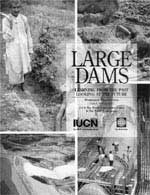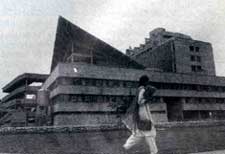No more kindergarten approach to climate
My worst fears are coming true; and that has more to do with the politics of climate change than its reality. While concern on global warming reaches a crescendo, the world, instead of finding
My worst fears are coming true; and that has more to do with the politics of climate change than its reality. While concern on global warming reaches a crescendo, the world, instead of finding

US biotech industry gears up to play dirty in Europe
Blind bureaucracy and rapacious industry in Indonesia have forced the jungle to strike back with a vengeance at its tormentors

The amendments to the Montreal Protocol made at the 9th Meeting of Parties may help curb smuggling of ozone depleting substances and ensure compliance. But they place a heavy responsibility on developing countries who have to move towards the use of subst

constructive dialogue and objective assessments have always been a casualty in the conflicts and controversies that have surrounded large dams. Such projects have nevertheless played a major role in

SAARC's proposal to set up a gene bank is still hanging fire though Northern countries have already started to privatise their genetic resources

Instead of treating AIDS patients in hospitals, an organisation in Uganda is effectively extending health care to them in their own homes

A tussle over funding clouds issues of climate change a biodiversity.

Despair and devastation stare India"s artisans in their face, as resource crunch, modern civilisation and government apathy combine in an onslaught on their teetering citadels. Down To Earth presents an exhaustive analysis

IT IS perhaps unfair for an economist to review a book which was originally submitted as a PhD thesis in anthropology. Unlike other anthropological works, a doctoral dissertation is necessarily less
Now that the reality of climate change has been accepted even by its strongest sceptics, there is a rush to find answers. The latest buzz is to substitute the use of greenhouse gas emitting fossil

Alternatives to keep animals away from scientific research labs

Doctors are finding it difficult to cope with the increasing incidence of thyroid cancer among children innocent victims of radioactivity.

The Indian government invests Rs 34 lakh to educate each IIT graduate. It therefore has the moral authority to get him or her to work for the country, at least for a period of five years

Mexico can't sell its "dolphin unfriendly" tuna to USA. Japan faces punishment for exporting jewellery made of hawksbill sea turtle shell. Malaysia is penalised for exporting rainforest wood. All over the world, green trade wars are raging. But trade ban

SPICES have drawn intrepid merchants to Indian shores through history, but falling international prices and uncertain demand abroad are worrying Indian growers, who supply about one-third of the

A us withdrawal of patent on the use of turmeric as a wound healing agent would do little to solve the greater problem of protecting traditional systems of knowledge

The attack on a Bangalore seed company was reported as the start of a farmers' movement against globalisation of agriculture. Now, some farmers find the GATT proposals beneficial.

WHATEVER their area of work, non-governmental organisations (NGOs) have made the most headway in involving people in managing their natural resources. Says one NGO activist, "Local people are very

Scientists became aware of acid rain more than a century ago